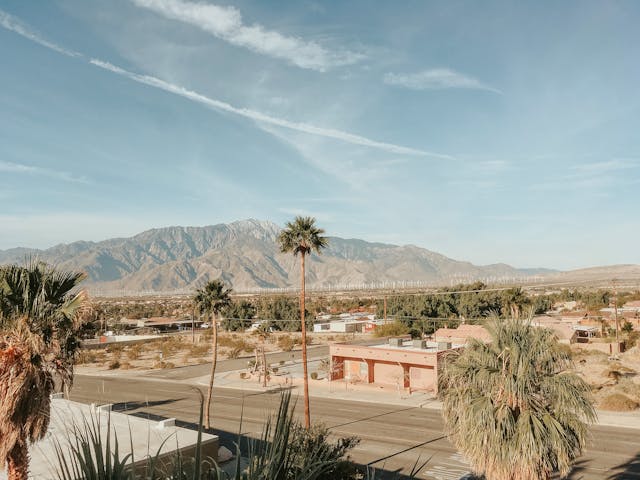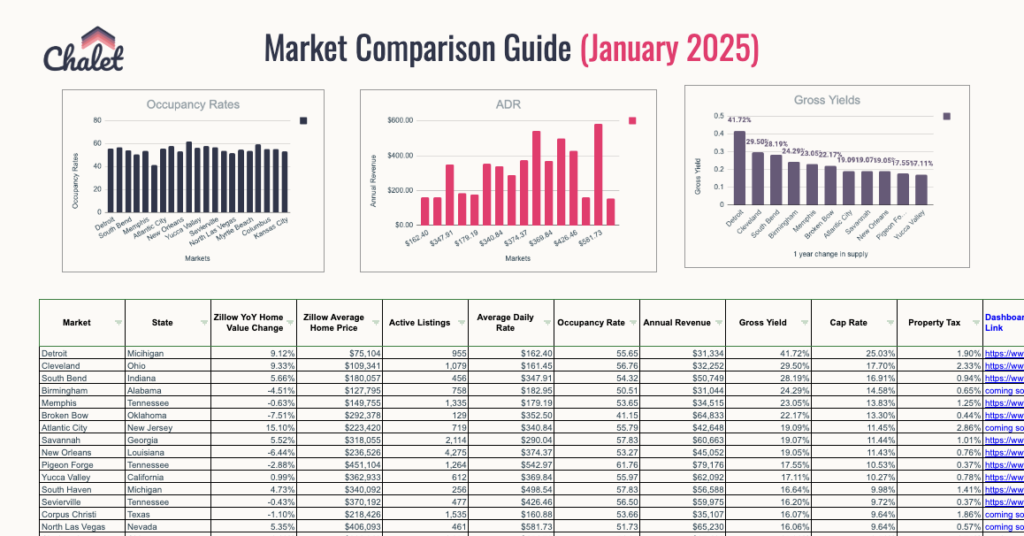Last updated: January 2025
Comprehensive FAQs for Short-Term Rental (STR) Regulations in Palm Springs, CA
Investing in short-term rental (STR) properties requires an in-depth understanding of local regulations. Below is a comprehensive list of frequently asked questions (FAQs) for STR operators and investors to help you navigate the rules in Palm Springs and stay compliant while maximizing profitability.

1. What is considered a short-term rental in Palm Springs?
A short-term rental is defined as the rental of a residential dwelling unit, or any portion thereof, for a period of 28 consecutive days or less, without the presence of the property owner.
2. Do I need a permit to operate a short-term rental in Palm Springs?
Yes, a Vacation Rental Registration Certificate is required to operate a short-term rental. The operation of any STR without this certificate is prohibited.
3. What are the zoning laws for STRs in Palm Springs?
STRs are restricted to single-family residential neighborhoods and are subject to a density cap, which limits Vacation Rental Registration Certificates to 20% of all residential units within a specific neighborhood.
4. Are there occupancy limits for short-term rentals in Palm Springs?
Yes, occupancy limits are set at two persons per bedroom, plus an additional two guests, with a maximum of eight overnight guests per vacation rental property. Additionally, up to two minor children under the age of 12 are allowed to stay beyond the maximum occupancy limits. Occupancy limits must be strictly adhered to in accordance with city regulations, including specifications for daytime occupants and vehicle limits.
5. What taxes are short-term rental hosts required to pay?
Hosts must collect and remit an 11.5% Transient Occupancy Tax (TOT) and a 1% Tourism Business Improvement District (TBID) fee. Returns must be filed monthly, even if no rental activity occurs.
Top 100 Airbnb Rental Markets

Instantly compare top 100 short-term (Airbnb) rental markets in the US
6. What are the safety and health requirements for STR properties in Palm Springs?
STRs must comply with fire, building, and safety standards, including smoke detectors, carbon monoxide detectors, fire extinguishers, and annual inspections. Proof of compliance and inspections is required during the registration process.
7. How are noise and nuisance complaints handled in Palm Springs?
STRs are subject to strict noise regulations, including a ban on amplified sound outdoors. Violations can lead to warnings, fines, or the suspension/revocation of permits. The property owner or designated contact must be available to respond within 15 minutes to noise complaints.
8. Can I manage multiple short-term rental properties in Palm Springs?
Owners may operate multiple properties but must have separate Vacation Rental Registration Certificates for each. However, financial interest in more than one STR is generally limited for individuals unless certain exceptions apply.
9. What are the penalties for non-compliance with STR regulations in Palm Springs?
Penalties include fines, suspension, or revocation of the Vacation Rental Registration Certificate. Operating without a certificate can result in administrative fines of up to $5,000, and further violations may lead to permanent ineligibility.
10. Are there any updates or changes to Palm Springs’ STR regulations I should be aware of?
As of May 25, 2023, the City Council adopted Resolution No. 25113, modifying certain user fees and charges related to vacation rentals. Prior to that, on November 28, 2022, the City of Palm Springs City Council adopted an Ordinance amending and reinstating Chapter 5.25 regarding Vacation Rentals. Regulations are subject to ongoing updates. The City Council periodically reviews the implementation and effectiveness of STR ordinances, with recent changes including stricter density caps and revised fees. For the most current information, regularly consult the city’s official website.
11. Can I self-manage my short-term rental, or do I need a property management company in Palm Springs?
Owners may self-manage their rentals, but must comply with all local regulations, including providing a local contact person available 24/7 to respond to complaints or issues within 30 minutes.
12. What are the insurance requirements for short-term rentals in Palm Springs?
Owners are required to carry either a short-term rental insurance policy or a personal liability policy with a minimum coverage limit of $500,000 per occurrence. This insurance coverage ensures protection against liabilities related to the operation of the rental property.
13. Are there any local rules regarding hosting platforms (e.g., Airbnb, Vrbo) in Palm Springs?
All advertisements for short-term rentals must include the City-issued Vacation Rental Registration Certificate number. Failure to display this number in any advertising, including online platforms, print, or media, is a violation subject to penalties.
14. What are the inspection requirements for STRs in Palm Springs?
STRs must pass building, fire, and safety inspections before a certificate is issued and annually thereafter. Inspections ensure compliance with health, safety, and occupancy requirements.
15. Are there any neighborhood-specific restrictions for STRs in Palm Springs?
Yes, neighborhood-based density caps limit the number of Vacation Rental Registration Certificates that can be issued, maintaining a balance within residential areas.
16. Is there a cap on the number of STR permits issued in Palm Springs?
Yes, there is a 20% cap on Vacation Rental Registration Certificates within each neighborhood, preventing over-saturation of STRs.
17. What parking requirements exist for STRs in Palm Springs?
On-site parking is required for STR guests, with no on-street parking permitted. The number of vehicles allowed is limited based on property specifications.


